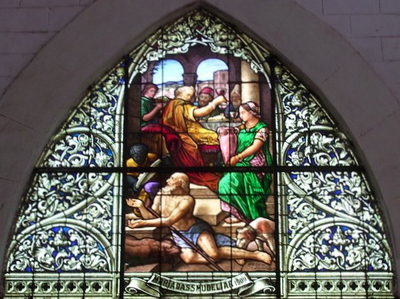
When I give instruction to parents before celebrating a baptism, I like to tell them to pay close attention to how the ritual begins. It doesn’t start with an opening prayer, or the sign of the cross, or a hymn. It begins with a question: “What name do you give your child?” It sounds so simple. But it is rich with meaning.
It connects us – in a profound way, I think — back to Genesis: to the first man, the fallen man, Adam, and the origins of the human race. What did man do after God created him? He set about giving the rest of creation a name.
He identified everything around him. And in doing that, in a small but significant way, man continued the creation that God had begun in the world, by creating an identity for everything, a way of knowing the world.
Having a child, and naming a child is a way of participating in that ongoing creation. When someone has a name, they are known not just to themselves, but to others. They become part of the wider world.
And that brings us to the gospel we just heard – and one of the most famous names in all of scripture. In fact, this is the only parable Jesus told in which he gives a character a name.
And that name is Lazarus.
Lazarus means “God is my help.” And surely, it fits the poor man in this parable – a hopeless, helpless figure who lives among dogs and is reduced to begging outside a rich man’s door.
In a cruel irony, the rich man has everything — except a name.
Lazarus has nothing — BUT a name.
Even the rich man knows enough of Lazarus to know his name – from his afterlife of torment, he is able to call out to Abraham, and ask him to let Lazarus help him. In a role reversal, it is now the rich man who has to beg. And his begging goes unrewarded.
It’s been said that the rich man is condemned to suffer not because of what he did, but because of what he didn’t do. He ignored Lazarus when he could have helped him. And he pays the price in eternity.
Luke, whose gospel is brimming with humanity, and empathy, gives us this story as a way of reminding us of our obligations to one another. You cannot be a follower of Christ and live in a vacuum. We continually bump up against the world, a world that needs our charity, our compassion, our love.
And every one of us has a Lazarus in our own life.
Who are the ones we shun? The ones we see every day, but avoid? Who are the people we disregard, or dehumanize, or diminish? Who are the ones who are helpless…but that we could help?
Of course, you might think of the homeless guy we pass on the street, or step over on the sidewalk. Maybe it’s the filthy stranger we ignore when he comes on the subway, rattling a cardboard cup.
But maybe there are others. It could be a woman at work that nobody likes, the one everybody gossips about. It might be the neighbor down the hall who plays his stereo too loud. It might even be someone in your own family. A sibling. A child. Maybe, even a spouse.
If we do an inventory, we can see that there is more than one kind of poverty, more than one kind of need. The poverty of depression or loneliness. The neediness of being a social misfit. We all have Lazaruses in our lives – the ones we could help, but don’t. The ones in need whom we neglect.
But every human life deserves at least the dignity of our attention. All of those we encounter — like Lazarus — have a name. An identity. A way by which someone knows them.
At the very least, God knows them.
Not long ago, I read a story about a name. And it begins with a woman who has an unusual one herself: Severa Mukakinia.
Severa was featured in a documentary called “God Sleeps in Rwanda,” about five women who survived a massacre by the Hutu tribe. Severa had watched the Hutus butcher all seven of her children. She had been gang-raped, and left for dead, dumped in a local river. And then, as she struggled to recover from that nightmare, she discovered that she was pregnant – the result of one of the rapes.
Severa could have had an abortion. But she didn’t. She knew it was not her child’s fault. So she kept the baby. And after it was born, a beautiful little girl, she gave her child a beautiful name: “Marie Chantal Akimana.” It means “Child of God.”
And she loves that little girl madly, deeply, courageously. “I fell in love with her,” Severa said, “when she smiled at me.” She knows that there may yet come some good from that evil that shattered her life. She sees beyond the act that created that child, to the God who loves her, and who wanted her to come in to the world. Perhaps, in her way, Severa also sees in her own life the very meaning of the name Lazarus: “God is my help.”
Next week begins Respect Life month. It’s fitting, I think, that we are hearing this gospel now. Because it is, in a way, pro-life. In the parable of the rich man and Lazarus, Christ calls on us not to act like the rich man, who ignored others, and looked out only for his own comfort, and treated life as dispensable.
No. He calls on us, in fact, to be more like that suffering woman from Rwanda who, in the midst of suffering, still chose to honor life. To see its dignity and worth. To recognize it, to identify it, to know it by name.
Because every one of us is Akimana.
Every one of us is a Child of God.

